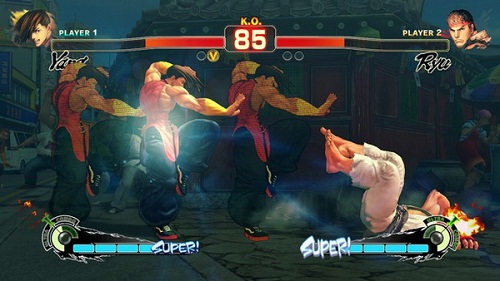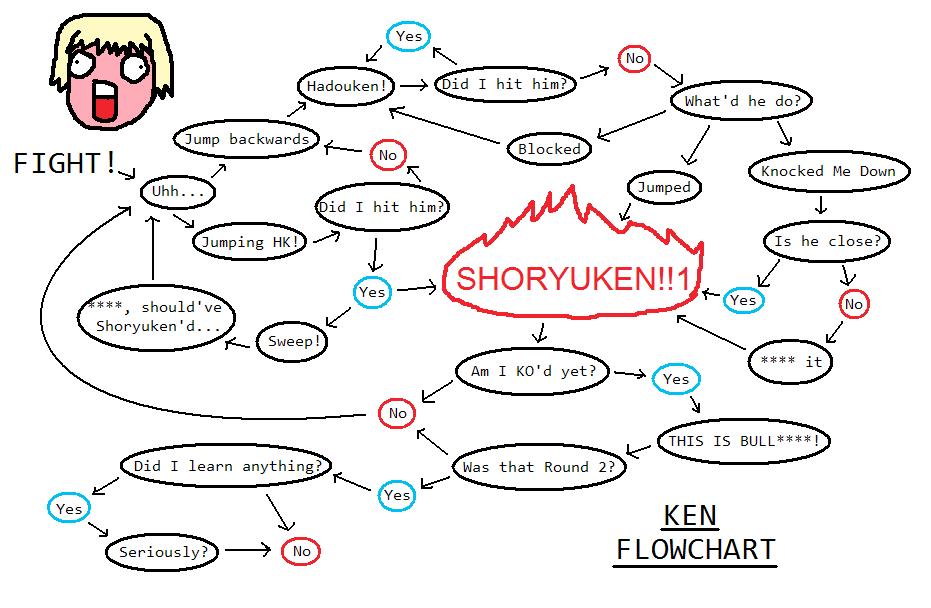“To feel envy is human, to savor schadenfreude is devilish.” – Arthur Schopenhauer, On Human Nature
What does it take to be a World Warrior? Patience. The ultimate iconic picture of Capcom’s Street Fighter series comes from Ryu, the Japanese wanderer/Shotokan warrior who travels around the world looking for the greatest challenges. With only a bag in his hand and a gi on his body, he purifies his mind through shunning self-awareness in combat – the denial of self.
Such denial of self, however is not what Street Fighter IV teaches me. Online play turns me into a cursing curmudgeon who yells at myself, other people in the room, and fills me with hatred for the gal/guy on the other end of the ethernet cable. I am completely aware of myself at all times. When I finally win, their tears are absolutely delicious. We can call it Schadenfreude – to wish the misery of other people.
While there are other high stakes competitive games, fighting games like Street Fighter take griefing to a different level. Unlike a multi-player shooter, online Street Fighter become a seriously concentrated game of mental chess. Street Fighter places you and one other person into combat on a two-dimensional plane to a knockout or timeout. There’s no teammates standing between you and your opponent – just your brain, and your opponent’s brain attempting to win at all costs.

That victory, though, must always come at the expense of another player. Street Fighter online is an intensely personal experience with an arbitrary foe. What do I know about these people other than that they play Sagat, or Ryu, or Cammy? All I know is that I do NOT like what they’re doing to me. Or what I’m doing to myself.
I accept losses in offline local play. Every mistake comes from human fallibility: bad guesses or execution errors. But online, a player’s varying bandwith isn’t large enough to fulfill the precision requirements of a fighting game. To be more specific: variable input delay netcode assumes that you live in Japan, and live close to everyone else! In that environment, two people can play with a 1-2 frame delay, which is acceptable; in the United States, the variance of Internet connectivity and the distance of those connections inevitably turns variable input delay netcode into a total mess for many games (this is why most fighting game players advocate for rollback netcode, but that’s a digression for a different day…).
Thus, many games produce lag as a result of these real-world variables. Lag makes it so tactics that don’t work offline work perfectly well online. For example, many players I’ve encountered spam fireballs, jump backwards repeatedly from close range and throw more fireballs, or throw you over and over again. Throws, especially, become incredibly important because to tech (that is, avoid and cancel) an opponent’s throw, one only has a four frame (4/60ths of a second) window to press the buttons to counter it. Street Fighter requires a pinpoint timing and understanding the frame data of moves, so any little millisecond delays CAN and WILL tilt you off kilter. A 5 frame delay makes throw teching impossible. Sound like fun?
Playing Vega and need to perform a one frame link between a crouching light punch and a crouching medium punch? Good luck! Expect to fail at doing that AND find yourself flat on your back from an invincible reversal attack while your opponent’s avatar repeatedly screams “SHORYUKEN” in your face. It’s not like that particular string forms an essential part of Vega’s mid-range controlling game plan, right (SARCASM DETECTED)? Vega isn’t considered a very good character, even if I play him often. He needs all the help he can get, and messed-up combos and movements do not aid me in my quest for victory. Any guy with a long range game and a fireball wrecks Vega’s beautiful face. They can just play flowchart and find success:

Who isn’t angry from losing to a strategy that requires no effort, yet you cannot counter it due to forces outside your control?
As a result, the anonymous players of Street Fighter IV put me into a state of mind that wouldn’t become acceptable in an actual face-to-face confrontation. Dropped (that is, missed combos) happen frequently. Punishment opportunities disappear due to a slip of the frame rate. Suddenly, I am near death after successfully pressuring my opponent for a whole match. They crush my spirit and spit me out, and I hate them for it. I wish for their misery, that someone would employ the same tactics to them. Or, at the very least, that they would let me play them again. But they won’t; they think themselves superior and move on.
When I get to run it back, that’s when I know what to do. So then I do the same thing – except I am the better man. I win through a superior mind-game, force them to make mistakes and predict everything they do like a man possessed. I crush their spirit. Once you’ve done this, a second round becomes a massacre. They become reticent on offense. They fear your prowess and make huge mistakes that I frequently take advantage of. This satisfies me to the core.
Am I receiving pleasure from the thrill of victory, or the agony of defeat on their end? Do I like the competition, or do I just want to destroy someone – if not virtually, then mentally? Does my Schadenfreude worry you?
This hasn’t prevented my playing the game more, however. In fact, I’ve been playing Street Fighter more than ever. To remove the problem, one must cut at the source, and the source isn’t faulty internet connections or, as the fighting game community would say, being salty. Rather, the problem lies with me.
In every match, a player can learn something about themselves. Did I execute correctly? What tricks and tactics did he use? Don’t shout; think. Adapt. Recognize the problem with your game, and stop blaming the opponent for imagined grievances or wrongs. Persistence, determination, and skill wins a match, even in the realm of the Internet. It’s a friendly competition, not a fight to the death!
Schadenfreude occurs when you stop thinking of your opponent as a person, and more an obstacle to be conquered. The focus is on the other’s faults rather than your own. preventing change in yourself. To make change, we need to become amateurs again and re-evaluate ourselves. Otherwise, you find yourself motivated by a blind hatred and pleasure in misery that prevents true self-improvement.
Each loss, either by my own hand or the caprices of Internet connections, becomes a learning experience. You learn to accept losses due to lag, simply because you can’t do anything about it. You must understand that people will defeat you, and you defeat them in return. Circumstances remain out of your control – why get angry over it? Life remains imperfect and so does Street Fighter’s online play.
Becoming a World Warrior – or an Online Warrior, in this case – requires awareness of yourself and your character. All things being equal, I’m incredibly terrible at Street Fighter IV. Nothing remains up to snuff, especially against players who decimate me in one giant combo that I can barely comprehend. Yet I am continually learning and striving toward that moment of zen where everything falls into place, and I dissolve into a moment of total engagement with the game and the match.
Then, the joy comes in the match itself, not in any preconceived notions of victory or defeat. The victory comes through overcoming your own failings and fears, not in the downfall of your foe. If you play perfectly, you deserve it; that’s a good game. Do not rejoice when your enemy falls, and do not let your heart be glad when he stumbles, but certainly be glad when you conquer yourself.
